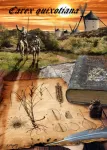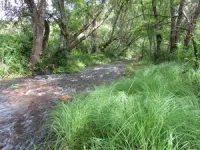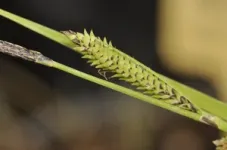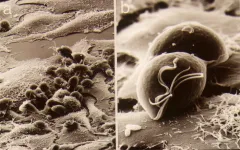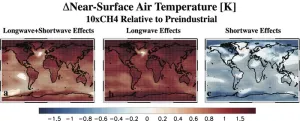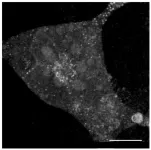(Press-News.org) The knowledge of biodiversity in allegedly well-known places is not as complete as one would expect and its detailed study by researchers continues to offer surprises, is what we find out in a new study of the flora of south-central Spain.
Now, Spanish botanists from Pablo de Olavide University (Seville, Spain) have described a new plant species of the papyrus family (Cyperaceae) restricted to the La Mancha region in south-central Spain. This region is in fact well-known for classic literary fans, who might recognise the name as the main setting in Miguel de Cervantes’ (1547–1616) masterpiece Don Quixote.
The epic novel, which tells the story of the life and journeys of Alonso Quijano, a Spanish hidalgo (nobleman), who becomes the knight-errant Don Quixote de la Mancha, is commonly considered to be one of the greatest literary works ever written, with its number of editions and translations thought to be only surpassed by those of the Bible.
The new species, now scientifically known as Carex quixotiana, belongs to sedges of the genus Carex, a group of herbs included in the papyrus family (Cyperaceae). The classification (taxonomy) of these plants is difficult, as it is a highly diverse and widely distributed genus, whose species are frequently hard to tell apart. In fact, C. quixotiana has itself evaded the eyes of expert botanists for decades, because of its close resemblance to related species.
“Cryptic species are frequent in complex plant groups, such as sedges, and integrative studies encompassing different data sources (e.g. morphology, molecular phylogeny, chromosome number, ecological requirements) are needed to unravel systematic relationships and accurately describe biodiversity patterns,”
says Dr. Martín-Bravo, senior author of the paper.
After a preliminary genetic study pointed to something odd about specimens of what was later to be known as Carex quixotiana, the authors set off on exhaustive field collecting campaigns across La Mancha. As they studied additional populations of the plant in further detail, using morphology, phylogenetics, and chromosome number, the scientists confirmed that they were looking at a species previously unknown to science. Understandably, the distribution range of the newly discovered species, restricted to the mountain ranges surrounding La Mancha (Sierra Madrona and Montes de Toledo), made the authors think about Cervantes’ masterpiece.
So far only known from 16 populations, Carex quixotiana prefers habitats with high water availability, such as small streams, wet meadows and riverside (riparian) forests.
Since little is known about the species’ demographics, including the number of mature individuals in the wild, further investigation is required to determine its conservation status. However, based on what they have learnt so far about the species, the authors of the present study assume that “it is an Iberian endemic with a relatively small number of populations and distribution range, which would benefit from legal protection and inclusion in in-situ/ex-situ conservation programmes.”
In conclusion, the scientists point to their results as yet another proof of how much there is still to learn about Earth’s biodiversity, even when it comes to supposedly well-known organisms, such as flowering plants, and countries, whose flora is presumed to be fully documented. The “Flora Iberica”, for example, which covers Spain and Portugal, has only recently been finalised, the team reminds us.
“In the present biodiversity crisis scenario, it is critical that we do not neglect basic scientific disciplines like taxonomy, since cataloguing biodiversity is a fundamental step towards its preservation and, thus, sustainable management,”
say the researchers.
Research article:
Benítez-Benítez C, Jiménez-Mejías P, Luceño M, Martín-Bravo S (2023) Carex quixotiana (Cyperaceae), a new Iberian endemic from Don Quixote’s land (La Mancha, S Spain). PhytoKeys 221: 161-186. https://doi.org/10.3897/phytokeys.221.99234
END
Don Quixote gives his name to a new plant species only known from La Mancha, Spain
2023-03-27
ELSE PRESS RELEASES FROM THIS DATE:
SwRI-developed instrument delivered for lunar lander mission
2023-03-27
SAN ANTONIO — March 27, 2023 —Southwest Research Institute recently delivered the Lunar Magnetotelluric Sounder (LMS) to Firefly Aerospace in Cedar Park, Texas, for integration into the Blue Ghost 1 lunar lander scheduled to arrive at the Moon in 2024. The sounder will determine the electrical conductivity of the interior of the Moon by measuring low-frequency electric and magnetic fields.
“For more than 50 years, scientists have used magnetotelluric techniques, which use natural characteristics of the Earth’s electromagnetic fields to determine the electrical resistivity of the subsurface for research and resource exploration,” said SwRI’s Bob Grimm, ...
Socially vulnerable carry disproportionate COVID burden due to lower likelihood of vaccination not vaccine effectiveness
2023-03-27
INDIANAPOLIS – The burden of the pandemic has disproportionately affected socially vulnerable populations. One of the first studies to look at the intersection of social vulnerability with COVID-19 vaccine utilization and effectiveness has found that while vaccination rates have varied substantially between socially vulnerable and communities that are not socially vulnerable, there has been no difference in vaccine effectiveness between those who are socially vulnerable and those who are not.
“We found that protection against emergency room and urgent care center visits, hospitalization and death conveyed by a COVID-19 mRNA vaccination ...
Positive experiences in close relationships are associated with better physical health, new research suggests
2023-03-27
Social relationships influence physical health, but questions remain about the nature of this connection. New research in Social Psychological and Personality Science suggests that the way you feel about your close relationships may be affecting the way your body functions.
Previous smaller-scale studies have examined the connection between relationship conflict or satisfaction with stress levels and blood pressure. The new research examines the effects of positive and negative relationship experiences on the body, as well as how these experiences and health outcomes change ...
Research may speed identification of patients who need liver transplants
2023-03-27
Research findings from Rutgers, the University of Michigan, the University of Texas Southwestern, and the Medical University of South Carolina could save lives by enabling faster and more accurate identification of hospitalized patients who need liver transplants or are likely to recover.
Retrospective analysis of blood samples and medical records from 270 patients admitted to the hospital with acute liver failure (ALF) found that concentrations of a short-lived but abundant serum protein called carbamoyl phosphate synthetase 1 (CPS1) helped predict which patients survive or die without a transplant.
“We still need to validate these results in more patients to ...
Finger-prick test developed for ‘trich’ a common, undiagnosed STI
2023-03-27
PULLMAN, Wash. – A quick, affordable diagnostic test developed by a Washington State University researcher may help curb one of the most prevalent but least discussed sexually transmitted infections.
More common than chlamydia or gonorrhea, Trichomonas vaginalis, also known as trich, causes no symptoms in about 70% of those infected. Even when asymptomatic, trich is linked to a host of bad health outcomes, including increased susceptibility to HIV, prostate cancer in men and infertility and pregnancy complications in women.
Trich is easily ...
Surprise effect: Methane cools even as it heats
2023-03-27
Most climate models do not yet account for a new UC Riverside discovery: methane traps a great deal of heat in Earth’s atmosphere, but also creates cooling clouds that offset 30% of the heat.
Greenhouse gases like methane create a kind of blanket in the atmosphere, trapping heat from Earth’s surface, called longwave energy, and preventing it from radiating out into space. This makes the planet hotter.
“A blanket doesn’t create heat, unless it’s electric. You feel warm because ...
A puff of air could deliver your next vaccine (video)
2023-03-27
INDIANAPOLIS, March 27, 2023 — Nobody likes needles, but they’re necessary for delivering many vaccines and biologics into the body. But what if those could be puffed through the skin instead, with just a little pressure, like being hit in the arm with a foam toy? Today, scientists report steps toward making that a reality. Using powdered vaccines that don’t require refrigeration and a system driven by compressed gas, their “MOF-Jet” could easily deliver therapeutics against cancer and other diseases in a relatively painless way.
The researchers will present their results at the spring meeting of the American Chemical Society (ACS). ACS ...
Human cells help researchers understand squid camouflage
2023-03-27
INDIANAPOLIS, March 27, 2023 — Squids and octopuses are masters of camouflage, blending into their environment to evade predators or surprise prey. Some aspects of how these cephalopods become reversibly transparent are still “unclear,” largely because researchers can’t culture cephalopod skin cells in the lab. Today, however, researchers report that they have replicated the tunable transparency of some squid skin cells in mammalian cells, which can be cultured. The work could not only shed light on basic squid biology, but ...
Genetic tests unexpectedly find genes linked to heart disease — now what?
2023-03-27
Statement Highlights:
As health care professionals, researchers and consumers increasingly use genetic testing, they are uncovering incidental genetic abnormalities, or variants, that are associated with cardiovascular diseases.
The statement writing committee cautions that incidentally identified single gene variants may or may not be risk factors for disease, so it is important to interpret them correctly and cautiously.
The new scientific statement offers a framework to support health care professionals in appropriately assessing individual genetic variants, communicating findings with patients and families, and, when ...
Biochar and energy from pyrolysis can pave the way for carbon-neutral agriculture in China
2023-03-27
Since the Paris Agreement to combat global warming was reached in 2015, many countries have committed to becoming climate neutral, i.e., achieving net-zero greenhouse gas emissions. The world's largest agricultural country, China, is also committed to join the green transition. As the largest agricultural country, China is also the world's biggest emitter of greenhouse gases, yet it has set itself a target of achieving carbon neutrality by 2060.
According to Professor and Head of Land-CRAFT at Department of Agroecology at Aarhus University Klaus Butterbach-Bahl, this places huge demands on agricultural systems: "Agriculture in China accounts ...
